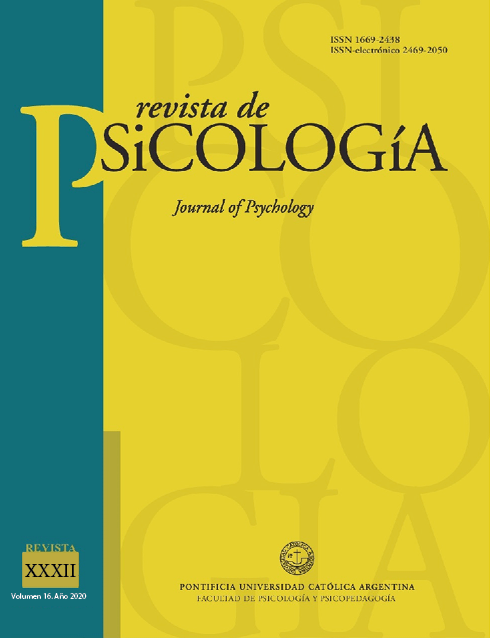University learning in the context ASPO (Social, Preventive and Compulsory Isolation)
DOI:
https://doi.org/10.46553/RPSI.16.32.2020.p104-118Keywords:
University learning, Preventive and compulsory social isolation, Student experienceAbstract
This article presents a descriptive approach to the student experience of university learning in the context of ASPO (Preventive and Mandatory Social Isolation) due to the Covid-19 pandemic. For this, a Google form was made with questions -open and closed- that was sent via email to students of all careers of the Teresa de Ávila UCA Faculty, Paraná Headquarters during the month of June of this year. It was answered voluntarily by 152 students from careers corresponding to the Humanities Department.
It presents a general description of the students who answered the questionnaire, the resources they have for the course, the use of the virtual platform EVA (Virtual Learning Environments) and the learning experience during the ASPO. The latter was categorized according to the learning of technological, bonding, self-organization and self-management resources. In addition, the difficulties they encountered are mentioned, such as changes in routines and daily life, relationships with teachers, being a newcomer, communication mediated by technology and digital skills and finally, the support they have and the demands or needs to be able to continue with the course in a remote manner.
Downloads
References
Area, M. y Adell, J. (2009). ―eLearning: Enseñar y aprender en espacios virtuales. En J. De Pablos (Coord): Tecnología Educativa. La formación del profesorado en la era de Internet. Aljibe, Málaga, 391-424.
Burin, D., Coccimiglio, Y., González, F., y Bulla, J. (2016). Desarrollos recientes sobre Habilidades Digitales y Comprensión Lectora en Entornos Digitales. Psicología, Conocimiento y Sociedad, 6(1), 191-206. http://www.scielo.edu.uy/scielo.php?script=sci_arttext&pid=S1688-70262016000100009&lng=es&tlng=es.
Caragliano, E. (2015). Nuevas competencias digitales. Reflexión Académica en Diseño y Comunicación (XXVI) 89- 92. https://fido.palermo.edu/servicios_dyc/publicacionesdc/vista/detalle_articulo.php?id_libro=544&id_articulo=11402
Carli, S. (2012) El estudiante universitario. Hacia una historia del presente de la educación pública. Siglo Veintiuno.
De Vincenzi, A. (2020). Del aula presencial al aula virtual universitaria en contexto de pandemia de COVID-19. Avances de una experiencia universitaria en carreras presenciales adaptadas a la modalidad virtual. Debate Universitario, 8(16), 67-71. http://200.32.31.164:9999/ojs/index.php/debate-universitario/article/view/238/242
Federación de docentes de la Universidad (2020). Informe: el impacto de la virtualización en la educación universitaria.https://fedun.com.ar/informe-sobre-el-impacto-de-las-cursadas-virtuales-en-la-educacion-universitaria/
Finkelstein, C. (2020). La enseñanza en la universidad en tiempos de pandemia. Citep. Centro de Innovación en Tecnología y Pedagogía. [Sitio web] http://citep.rec.uba.ar/covid-19-ens-sin-pres/
Gandulfo,C., Alegre, T. y Domínguez, M. (Comps.)(2020). El ASPO en Primera Persona. Relatos de estudiantes universitarixs viviendo la cuarentena en el nordeste argentino. Colectivo Syry Ediciones.
Lozano-Díaz, A., Fernández-Prados, J.S., Figueredo Canosa, V. y Martínez Martínez, A.M. (2020). Impactos del confinamiento por el COVID-19 entre universitarios: Satisfacción Vital, Resiliencia y Capital Social Online, International Journal of Sociology of Education, Special Issue: COVID-19 Crisis and Socioeducative Inequalities and Strategies to Overcome them, 79-104. http://doi.org/10.17583/rise.2020.5925
Nguyen, T., Dao, B., Phung, D. Q., Venkatesh, S., & Berk, M. (2013). Online social capital: mood, topical and psycholinguistic analysis, in ICWSM 2013: Proceedings of the 7th AAAI International Conference on Weblogs and Social Media, AAAI Press, Palo Alto, Calif.,449-456.http://hdl.handle.net/10536/DRO/DU:30057170
Unesco. Instituto Internacional para la Educación Superior de América Latina y el Caribe (IESALC) (2020) COVID-19 y educación superior: De los efectos inmediatos al día después. Análisis de impactos, respuestas políticas y recomendaciones.http://www.iesalc.unesco.org/wp-content/uploads/2020/05/COVID-19-ES-130520.pdf
Van Deursen, A. J. A. M., Helsper, E. J., y Eynon, R. (2014). Measuring digital skills. From digital skills to tangible outcomes. Project Report.http://www.oii.ox.ac.uk/research/projects/?id=112
Downloads
Published
How to Cite
Issue
Section
License



















